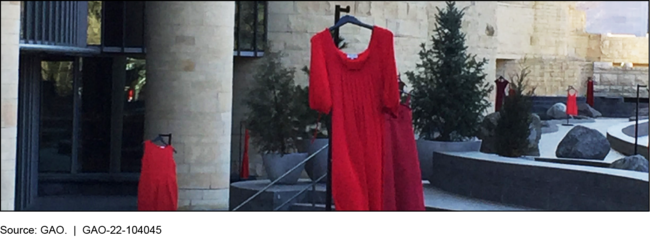
- Details
- By Native News Online Staff
The U.S. Government Accountability Office (GAO) publicly on Monday released a report that says the federal response to the missing and murdered Indigenous women (MMIW) crisis needs improvement.
The Missing or Murdered Indigenous Women; New Efforts Are Underway but Opportunities Exist to Improve the Federal Response GAO report concluded the U.S. Department of Justice (DOJ) and U.S. Department of the Interior (DOI) have missed numerous deadlines set by the Not Invisible Act and Savanna’s Act, and it recommended that the departments develop an action plan to ensure they’re doing all they can to combat the crisis of missing and murdered Indigenous women.
U.S. Sen. Catherine Cortez Masto (D-NV), a member of the Senate Committee on Indian Affairs, called on the Biden administration to do more to address the crisis of missing and murdered Indigenous women (MMIW) after the U.S. Government Accountability Office (GAO) released a report finding that the government has not done enough to respond to the crisis.
Sen. Cortez Masto has led efforts in the Senate to protect Indigenous women and girls, and she asked that the GAO put together this report to investigate the federal response to violence facing Native women across the country.
“We’ve given the federal government some powerful tools to finally develop a strategy to stop the crisis of missing and murdered Indigenous women,” Cortez Masto said. “But the government has to implement our legislation in a timely manner, as this report indicates. There’s a lot more work to do, and Native women and girls can’t wait.”
The report made the following four recommendations:
Recommendation 1: The U.S. Attorney General should develop a plan—including key steps, who will achieve them, and by when—for accomplishing ongoing analyses of data in existing federal databases and future data that may be gathered to identify relevant trends in cases of missing or murdered American Indian and Alaska Native women and areas of concern.
Recommendation 2: The U.S. Attorney General should develop a plan, including milestone dates, to develop and implement a dissemination strategy to educate the public about the National Missing and Unidentified Persons System (NamUs).
Recommendation 3: The U.S. Attorney General should develop a plan, including milestone dates, to conduct specific outreach to Indian tribes, tribal organizations, and urban Indian organizations regarding the ability to publicly enter information regarding missing persons through NamUs or other non-law enforcement sensitive portal.
Recommendation 4: The Secretary of the Interior, in coordination with the Attorney General, should finalize its draft plan establishing and appointing all members to the Joint Commission on Reducing Violent Crime Against Indians, as required by the Not Invisible Act of 2019, and include milestone dates for all steps in the process.
More Stories Like This
Native News Weekly (August 25, 2024): D.C. BriefsNavajo Nation Gaming Enterprise Marks Problem Gambling Awareness Month With $3.4M in Support
Cheyenne River Youth Project to Celebrate Women’s Strength at Barbie-Themed Passion for Fashion on March 14
Celebrating Native American Women
Native Bidaské: The Illusion of Freedom and the Myth of America 250, Leonard Peltier Speaks Out
Help us defend tribal sovereignty.
At Native News Online, our mission is rooted in telling the stories that strengthen sovereignty and uplift Indigenous voices — not just at year’s end, but every single day.
Because of your generosity last year, we were able to keep our reporters on the ground in tribal communities, at national gatherings and in the halls of Congress — covering the issues that matter most to Indian Country: sovereignty, culture, education, health and economic opportunity.
That support sustained us through a tough year in 2025. Now, as we look to the year ahead, we need your help right now to ensure warrior journalism remains strong — reporting that defends tribal sovereignty, amplifies Native truth, and holds power accountable.
 The stakes couldn't be higher. Your support keeps Native voices heard, Native stories told and Native sovereignty defended.
The stakes couldn't be higher. Your support keeps Native voices heard, Native stories told and Native sovereignty defended.
Stand with Warrior Journalism today.
Levi Rickert (Potawatomi), Editor & Publisher

